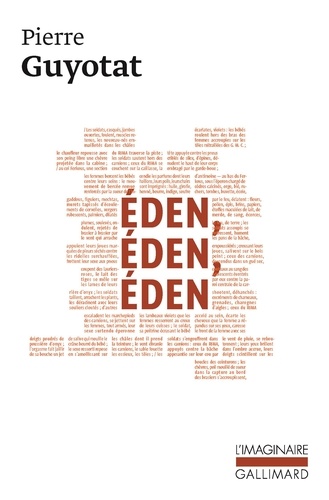

There are only spaces, pauses that seem to genuflect to the next sequence of thoughts. It is hard to breathe when reading this book. Many would not brave the fire for this one.Įden, Eden, Eden is a free text: free of all subjects, of all objects, of all symbols, written in space (the abyss or blind-spot) where the traditional constituents of discourse … would be superfluous. It truly IS for that unoffendable lot who will reach into the bonfire to save Love’s precious art, and Life’s freedom of expression. This extremely pornographic, epic narrative is not only utterly and completely unpalatable, it is artistically inspired and enthralling. Recommended for: the unoffendable reader in search of artistic avant-garde narrative streams of unpalatable filth that stabs at your sense of decency. Claude Simon (who won the Nobel Prize in 1985) resigned from the jury of the Prix Médicis after the prize wasn't awarded to Eden, Eden, Eden. François Mitterrand, and Georges Pompidou tried to get the ban lifted but failed. A petition of international support was signed (notably by Pier Paolo Pasolini, Jean-Paul Sartre, Pierre Boulez, Joseph Beuys, Pierre Dac, Jean Genet, Simone de Beauvoir, Joseph Kessel, Maurice Blanchot, Max Ernst, Italo Calvino, Jacques Monod, and Nathalie Sarraute). This book was banned from being publicized or sold to under-18s. In 1968, Guyotat became a member of the French Communist Party, which he left in 1971.Įden, Eden, Eden came out in 1970 with a preface by Michel Leiris, Roland Barthes and Philippe Sollers (Michel Foucault's text was received late and therefore didn't appear as a preface).

Based on Guyotat's ordeal as a soldier in the Algerian War, the book earned a cult reputation and became the subject of various controversies, mostly because of its omnipresent sexual obsessions and homoeroticism. In 1967, he published Tombeau pour cinq cent mille soldats (later released in English as Tomb for 500,000 Soldiers). In 1964, Guyotat published his second novel Ashby. Back in Paris, he got involved in journalism, writing first for France Observateur, then for Nouvel Observateur.

After three months in jail he was transferred to a disciplinary centre. In 1962 he was found guilty of desertion and publishing forbidden material. He was called to Algeria in the same year. Born in Bourg-Argental, Loire, Guyotat wrote his first novel, Sur un cheval, in 1960.


 0 kommentar(er)
0 kommentar(er)
